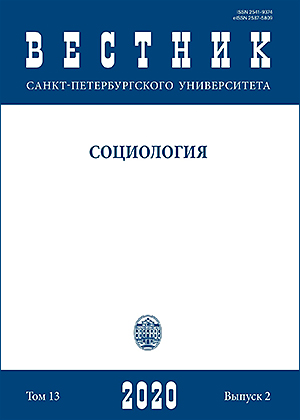Межфирменная мобильность и успешность профессиональной карьеры работников интеллектуального труда
DOI:
https://doi.org/10.21638/spbu12.2020.204Аннотация
В статье представлен критический обзор исследований взаимосвязи межфирменной мобильности работников интеллектуального труда с показателями их объективного и субъективного карьерного успеха. В контексте дискуссий о дестандартизации занятости и индивидуализации жизненных траекторий нелинейные паттерны карьерного развития, основанные на высокой мобильности работников в течение их трудового пути, привлекают все большее внимание исследователей. С позиций «новых» карьерных теорий и теорий постиндустриализма высокая мобильность связывается с достижением большего карьерного успеха по сравнению с традиционной карьерой. Возможность и способность оставаться мобильным рассматривается не только как условие адаптации к реалиям современного рынка, но и сквозь призму накопления уникального человеческого и социального капитала, приобретаемого благодаря опыту работы в разных компаниях. Противоположная точка зрения, в свою очередь, состоит в том, что лучшими работниками по-прежнему больше ценится стабильность. Потенциальные риски и потери, сопутствующие перемещениям, могут быть слишком высоки, поэтому те, кто придерживается модели долгосрочных трудовых отношений, могут оставаться в большем выигрыше. В статье автор систематизирует результаты существующих эмпирических исследований в рамках заданной проблематики, рассматривая влияние физической и психологической мобильности работников на показатели их объективного и субъективного карьерного успеха. В качестве индикаторов объективного успеха используются изменение размера заработной платы и уровень в должностной иерархии. Субъективный успех включает оценку успешности карьеры, удовлетворенность карьерой, достиженческими и недостиженческими аспектами
работы, воспринимаемую востребованность, вовлеченность в работу, удовлетворенность балансом работы и жизни и общее благополучие. Сопоставление результатов исследований подтверждает противоречивость теоретических взглядов относительно роли межфирменной мобильности в развитии карьеры. Подчеркивая необходимость дальнейшего изучения данной проблематики, автор предлагает перспективные направления возможных исследований.
Ключевые слова:
межфирменная мобильность, карьерный успех, безграничная карьера, работники интеллектуального труда
Скачивания
Библиографические ссылки
References
Загрузки
Опубликован
Как цитировать
Выпуск
Раздел
Лицензия
Статьи журнала «Вестник Санкт-Петербургского университета. Социология» находятся в открытом доступе и распространяются в соответствии с условиями Лицензионного Договора с Санкт-Петербургским государственным университетом, который бесплатно предоставляет авторам неограниченное распространение и самостоятельное архивирование.




